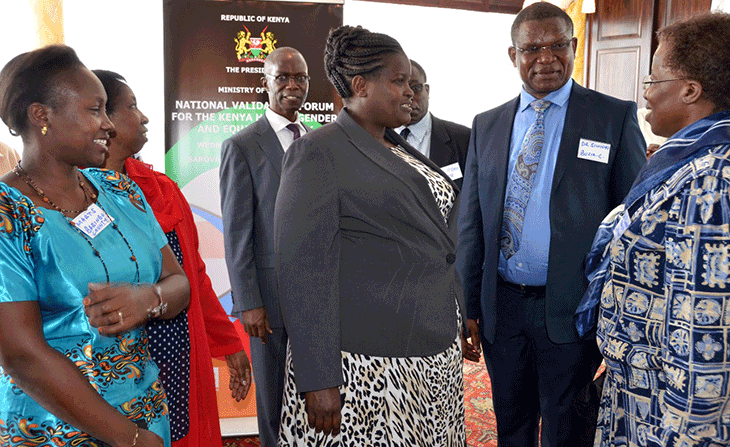The Health Policy Project ended in 2016. Work continued under Health Policy Plus (HP+) until 2022.
NEWS & VIEWS

Dr. Kassachoon (center) in discussion with participants at the meeting. Photo courtesy of Kenya News Agency.
December 31, 2014
NAIROBI, Kenya—Kenyan health sector stakeholders recently met in Nairobi to discuss the proposed Health Sector Gender and Equality Policy, which would address issues of gender and inequality within the sector. They concluded that the policy is timely and will help to eliminate long-standing inequities.
The meeting was convened by the Ministry of Health and sponsored by the USAID- and PEPFAR-funded Health Policy Project (HPP), which provides technical and financial assistance to the Ministry to develop fundamental policies, laws, and guidelines to comply with the provisions of the Constitution. The stakeholders determined that by focusing on the elimination of gender inequalities, the policy will also address issues that impede the achievement of the constitutional goal to secure “the highest attainable standard of health” for all citizens.
Although Kenya has recorded healthcare improvements on several fronts, gender differences remain and significantly influence health outcomes for women and children. For instance, deeply entrenched sociocultural practices constrain the ability of women and girls to control fertility decisions and to access life-saving reproductive and maternal health services. Similarly, men and boys are affected by gender divisions in certain patterns of health and illness, such as heart disease or workplace injuries, as well as by gender stereotypes that affect their access to services and quality of care.
Dr. Khadijah Kassachoon, the principal secretary at the Ministry of Health, spoke at the meeting, noting that the Kenyan government recognizes that gender inequalities provide a powerful framework to explain variations in women’s and men’s health. She also remarked that socioeconomic factors such as education and income are the most consistent predictors of health and mortality. Dr. Kassachoon believes that the country has an opportunity to develop a comprehensive policy that addresses long-standing gender inequities in healthcare and improves access to services for all.
The proposed policy identifies areas in which gender issues have affected health outcomes and includes strategies to mitigate them. Areas of concern include sociocultural practices that constrain the ability of women and girls to control family planning decisions, which also impact their access to family planning services and information. Others include HIV and AIDS, which disproportionately affect women in Kenya, who account for nearly 60 percent of adults living with HIV. The policy language also notes that empowering women to use maternal and child health services (and empowering men as supportive partners) is likely to lead to improved child health.
The policy aims to improve gender equity, increase access to and utilization of high-quality healthcare services, and to strengthen capacity for gender mainstreaming at all levels of the health system. It also seeks to institutionalize gender-responsive budgeting, resource allocation, and systems for data collection, use, and monitoring and evaluation throughout the sector. Lastly, it aims to strengthen community engagement and leadership to change gender and social norms for improved health.
The Health Sector Gender and Equality Policy aims to ensure equity in health service management, utilization, and outcomes, and is expected to be completed in early 2015.
What's New
- Something to Build On: “Innovation Exchange” Celebrates the Health Policy Project’s Close and a New Beginning
- What Will it Take for Tanzania to Achieve ART Targets and Ensure Long-Term Sustainability of the HIV Response?
- Helping Kenya’s County Leaders Advocate for Increased Health Investments
- HPP Holds Working Meeting on Ensuring Responsible PEPFAR Transitions for Key Populations
- Health Policy Project Celebrates 2016 International Women's Day
- HPP Staff Participate in White House Conference on HIV Stigma Reduction

